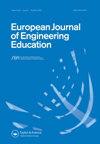工程教育中的数字游戏:系统回顾和未来趋势
IF 2.8
Q2 EDUCATION & EDUCATIONAL RESEARCH
引用次数: 13
摘要
数字游戏在高等教育中的应用在工程领域呈上升趋势。随着最近COVID-19的限制和向虚拟学习的转变,人们对虚拟实验室和数字游戏等技术增强的体验式学习工具的兴趣和需求预计会增加。本文综述了目前工程教育中基于数字游戏的学习实践。最重要的是,它提供了对不同工程学科中基于数字游戏的学习应用的见解。它还为研究人员和实践者提供了相关期刊和会议、可用游戏、研究设计和评估方法的见解,这些方法用于工程背景下基于数字游戏的学习。根据预先确定的纳入标准,对过去十年共发表的51篇文章进行了详细分析。研究发现,软件工程教育最广泛地评估了游戏的教育用途。18项实证研究还报告了使用不同评估方法的数字游戏的一些学习收益。这篇综述的发现表明游戏研究的传播在增加,并且可能在工程教育中使用游戏。本文最后强调了工程教育中基于数字游戏的学习的未来趋势。本文章由计算机程序翻译,如有差异,请以英文原文为准。
Digital games in engineering education: systematic review and future trends
ABSTRACT The application of digital games in higher education is on the rise in engineering. With the recent COVID-19 restrictions and the move to virtual learning, the interest in and the need for virtual laboratories and technology-enhanced experiential learning tools like digital games are expected to rise. This paper presents a review of the current practices in digital game-based learning for engineering education. Most importantly, it provides insight into the application of digital game-based learning across diverse engineering disciplines. It also provides researchers and practitioners with insights into relevant journals and conferences, available games, research designs and assessment methods being used in digital game-based learning in the context of engineering. Based on predefined inclusion criteria, a total of 51 articles published within the last decade were analysed in detail. Software engineering education was found to evaluate the educational use of games most extensively. Eighteen empirical studies also reported some learning gains with digital games using different assessment methods. The findings of this review indicate increase in the dissemination of games research and possibly in the use of games for engineering education. This paper closes by highlighting future trends in digital game-based learning for engineering education.
求助全文
通过发布文献求助,成功后即可免费获取论文全文。
去求助
来源期刊

European Journal of Engineering Education
EDUCATION & EDUCATIONAL RESEARCH-
CiteScore
7.30
自引率
13.00%
发文量
64
期刊介绍:
European Journal of Engineering Education is published six times a year in print and electronic editions and provides an essential forum for dialogue between researchers and specialists in the field of engineering education, at European and worldwide levels. European Journal of Engineering Education is the Official Journal of SEFI, the Socièté Européenne pour la Formation des Ingénieurs (the European Society for Engineering Education). SEFI is a non-governmental organization whose aims are to develop information about engineering education, to improve communication and exchange between professors, researchers and students and to promote cooperation between the various institutions concerned with engineering education.
 求助内容:
求助内容: 应助结果提醒方式:
应助结果提醒方式:


